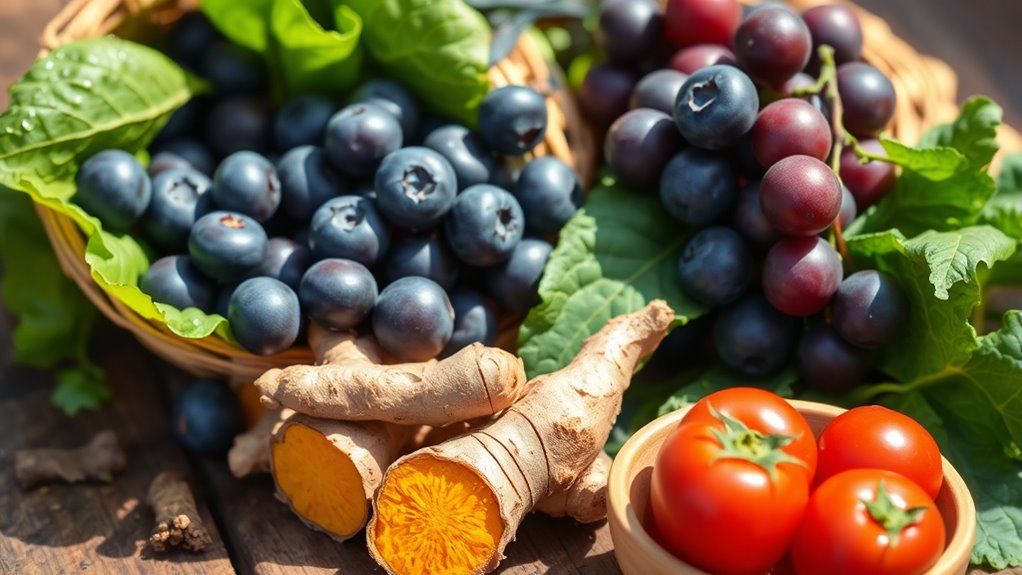To reduce your risk of chronic diseases like heart issues, diabetes, and arthritis, focus on eating anti-inflammatory foods. Incorporate nutrient-rich options such as fermented foods, like yogurt and sauerkraut, to support gut health, and spice up your meals with turmeric, ginger, and cinnamon for added benefits. Small, consistent dietary changes can make a big difference in lowering inflammation. Keep exploring, and you’ll discover simple ways to make these health-boosting choices part of your routine.
Key Takeaways
- Incorporate nutrient-dense, anti-inflammatory foods like fruits, vegetables, nuts, and whole grains to lower chronic disease risk.
- Consume fermented foods such as yogurt, sauerkraut, and kimchi to promote gut health and regulate immune responses.
- Use spices like turmeric, ginger, and cinnamon regularly for their natural compounds that reduce inflammation markers.
- Pair fermented foods with anti-inflammatory spices for a synergistic effect against chronic inflammation.
- Make small, consistent dietary changes to support long-term health and decrease systemic inflammation.

Have you ever wondered how your diet can influence inflammation in your body? The foods you choose daily can markedly impact your body’s inflammatory response, which in turn affects your risk of chronic diseases like heart disease, diabetes, and arthritis. Incorporating anti-inflammatory foods into your meals isn’t just about adding flavor; it’s about supporting your overall health. Fermented foods, such as yogurt, sauerkraut, kimchi, and kefir, are especially beneficial because they contain probiotics that promote gut health. A healthy gut helps regulate immune responses and reduces systemic inflammation. When your gut flora is balanced, it can prevent inflammatory processes from spiraling out of control. Adding these fermented foods to your diet regularly can boost your gut microbiome, improve digestion, and help your body fend off chronic inflammation. Additionally, choosing anti-inflammatory foods can help manage oxidative stress, which contributes to many chronic illnesses. Spice blends are another powerful tool in your anti-inflammatory arsenal. Think of spices like turmeric, ginger, cinnamon, and cayenne pepper—they’re packed with compounds that have natural anti-inflammatory properties. For example, turmeric contains curcumin, which studies have shown can substantially reduce inflammation markers in the body. When you incorporate these spices into your cooking, you’re not only enhancing flavor but also giving your body a daily dose of inflammation-fighting nutrients. Combining spices into blends can intensify their benefits and make it easier to include them in your meals. The key is consistency—making these spice blends a regular part of your diet helps sustain their anti-inflammatory effects over time. Pairing fermented foods with spice blends creates a synergistic effect. The probiotics from fermented foods support gut health, while spices combat inflammation at a cellular level. Together, they form a powerful duo that can help reduce chronic inflammation and lower your risk for related diseases. Switching out processed snacks for fermented options and seasoning your dishes with anti-inflammatory spices is a simple, sustainable step toward better health. Remember, small dietary changes can make a big difference. By choosing nutrient-dense, inflammation-fighting foods like fermented foods and spice blends, you’re actively working to reduce systemic inflammation and enhance your overall well-being. The more intentional you are with your food choices, the better equipped your body is to fight off chronic illnesses and promote a healthier, more vibrant life.
Frequently Asked Questions
Can Anti-Inflammatory Foods Replace Medication for Chronic Diseases?
Anti-inflammatory foods can’t fully replace medication for chronic diseases, but they can support natural remedies and enhance your treatment plan. You’ll benefit from incorporating lifestyle modifications, like a balanced diet rich in anti-inflammatory foods, regular exercise, and stress management. Always consult your healthcare provider before making changes, as medications are often essential. Combining these approaches can improve your overall health and potentially reduce reliance on medication over time.
How Quickly Can I See Health Benefits From Eating Anti-Inflammatory Foods?
Like a ripple in a pond, you might notice health benefits from anti-inflammatory foods within a few weeks, but it varies. Consistently eating these foods daily supports quicker timeline benefits, reducing inflammation and improving overall health. You may feel more energetic or see reduced symptoms sooner, though lasting effects depend on your lifestyle and existing conditions. Stay committed, and over time, your body will thank you with each nourishing bite.
Are There Any Side Effects of Consuming Anti-Inflammatory Foods Regularly?
Consuming anti-inflammatory foods regularly is generally safe, but you might experience possible allergic reactions or nutrient imbalances if you overconsume certain items like nuts or fish. Stay aware of any adverse effects or allergies, and make certain you maintain a balanced diet. Moderation is key, and consulting with a healthcare professional can help you avoid potential side effects while maximizing health benefits from these foods.
Which Anti-Inflammatory Foods Are Best for Specific Conditions Like Arthritis?
You should focus on turmeric benefits, as this spice contains curcumin, which can help reduce inflammation and ease arthritis symptoms. Incorporate leafy greens like spinach and kale into your diet; they’re rich in antioxidants and nutrients that combat inflammation. These foods work together to support joint health and decrease pain. Regularly consuming turmeric and leafy greens can be a natural way to manage arthritis symptoms and improve overall well-being.
How Do Anti-Inflammatory Foods Interact With Other Medications?
You might worry about drug interactions when adding anti-inflammatory foods to your diet, but most are safe. Still, some foods, like turmeric and ginger, can affect blood clotting or interact with blood thinners. Always consider supplement considerations and consult your healthcare provider before making big changes. This guarantees you enjoy the benefits without risking adverse effects or compromising your medications’ effectiveness.
Conclusion
By embracing anti-inflammatory foods, you’re planting seeds of health that bloom into a vibrant, disease-resistant life. Think of these foods as your body’s trusty firefighters, snuffing out the sparks of inflammation before they ignite chaos. Every bite is a brushstroke on the canvas of your well-being, turning your daily meals into a masterpiece of vitality. So, fill your plate with these nourishing treasures and watch your health flourish like a garden in full bloom.









